American Pharoah's Triple Crown obliterates years of disappointment

ELMONT, N.Y. — And so in the long shadows of an early evening in the 37th June since the last, the last, the last—and my god, the last—at a venerable place where hope and desperation had so often melted into painful defeat, history finally let go. The moment unfolded as if from another time, asking a sport for trust that had been lost in too many defeats, too many disappointments, too many euphoric buildups that crashed in gutting failure and sent its loyal fans sulking into the darkness, unfulfilled. For so long, horse racing had been stuck on the same, yellowed page, so many times the Triple Crown had seemed at hand and so many times cruel reality dropped a hammer on old Belmont Park and so many times a generation and more was left without a legend of its own to pass along, left instead to live with musty recollections, growing more distant by the year.
It was a bay colt named American Pharoah who finally set everybody free. At a few minutes before seven on Saturday night, he won the 147th running of the Belmont Stakes and became the 12th winner of racing’s Triple Crown (the Kentucky Derby, the Preakness Stakes and the Belmont Stakes), mercifully ending the drought that had held racing hostage since 1978, when Affirmed held off Alydar in the stretch at Belmont to win the third Triple Crown of the decade. Twelve horses had since won the Kentucky Derby and the Preakness, only to fail in the Belmont Stakes (a 13th, I’ll Have Another, won the first two legs but was scratched from the Belmont with an injury). Twelve horses had lost in every imaginable way, and some had begun to say that perhaps there would never be another Triple Crown at all.
American Pharoah buries decades of Triple Crown failure with Belmont win
All of that ended in dominance. American Pharoah led for every step of the Belmont’s brutal 1½ miles, a distance which is rarely run in American horse racing and which none of the Belmont’s eight starters is likely to run again in his lifetime. Jockey Victor Espinoza, who previously lost Triple Crown attempts in 2002 (War Emblem) and in ’14 (California Chrome), scarcely asked Pharoah to run until he hit the top of the Belmont stretch, and then hit him just twice right-handed with his whip, at which point Pharoah accelerated away to win by 5½ lengths over second-place finisher Frosted.
Pharoah rolled through the homestretch, each of his graceful strides a scream of atonement for the past failures of others, failures that had been shared and mourned by the entire sport—here for Spectacular Bid (1979) and his safety pin and overmatched jockey, here for Real Quiet (’98) and his nose-length loss to Victory Gallop, here for Smarty Jones (2004), run down in the homestretch by Birdstone. With every stride, the Belmont grandstand quaked, engulfed by a primal roar of exorcism, desperation given sound.
In a second floor box stood trainer Bob Baffert, the familiar, 62-year-old white-haired veteran who had three times seen his horses beaten for Triple Crowns in the Belmont. Behind him was his 21-year-old daughter Savannah—whom Baffert held in his arms as Real Quiet, whom he trained, was beaten at the line—a reminder of time gone by and opportunities painfully lost. He watched nearly stone-faced as the race unfolded, but shot his right fist into the air at the finish before embracing his wife, Jill. “That’s it,” Baffert said. Jill threw her arms around her husband’s shoulders, began to cry and said, “You did it.” They held each other for what seemed like minutes.
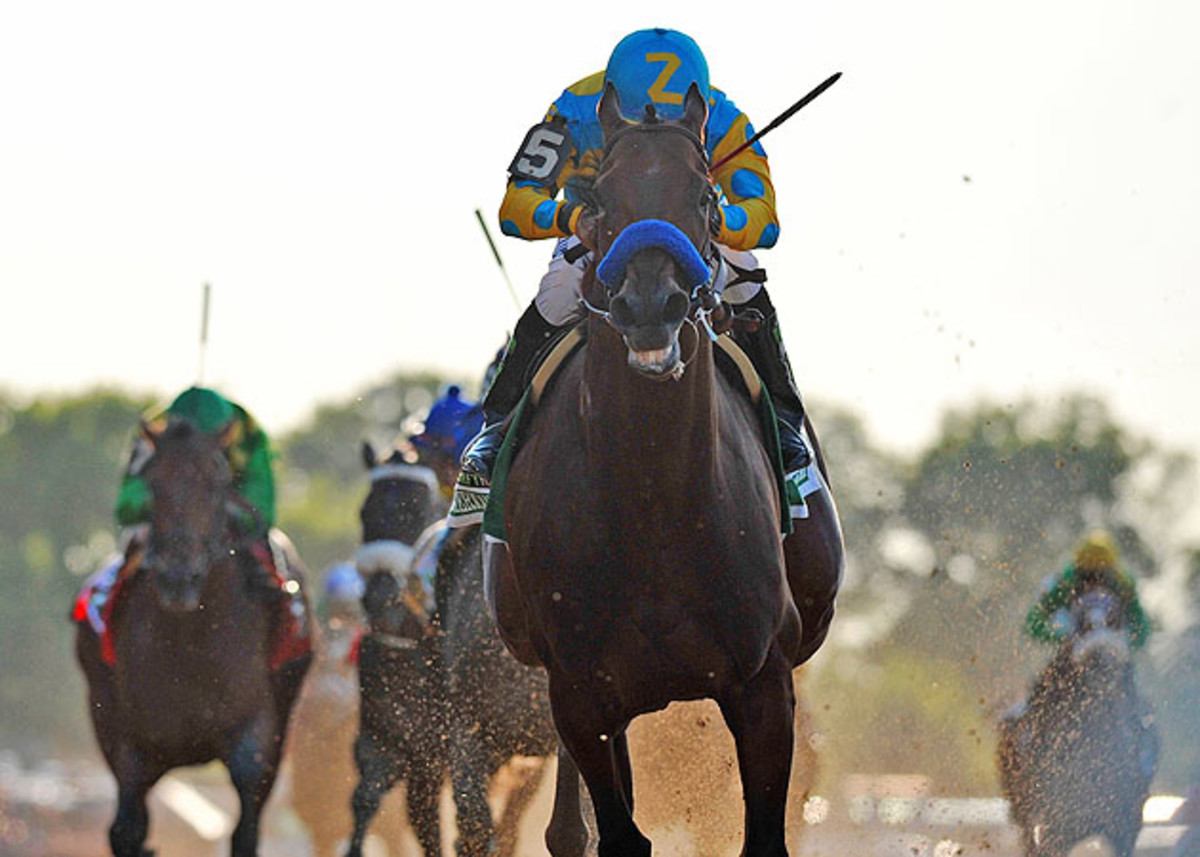
Belmont exploded in celebration, the roar growing louder when louder seemed inconceivable, a prayer of thanks delivered in full throat. Rival trainer Todd Pletcher, whose Materiality chased Pharoah early before finishing a distant eighth (the modern-day version of Sham, who chased Secretariat early in his epic 1973 Belmont and finished nearly 50 lengths behind), fought through the crowd to congratulate Baffert. “That horse is too good,” he said as he walked away. Another trainer, Kiaran McLaughlin, who trains runner-up Frosted, also pushed his way to Baffert and congratulated him as the roar built ever louder.
Baffert walked along a catwalk toward the winner’s circle and was embraced by a weeping Ahmed Zayat, the controversial and flamboyant Egyptian expatriate who owns American Pharoah and had delivered him to Baffert’s barn last spring. Zayat screamed over the din to Baffert: “Bob! Bob!” And when Baffert stopped, Zayat threw his arms around Baffert’s neck and began weeping. “We all wanted this,” Zayat would say later. “We all wanted this for the sport.”
Around the breadth of the giant grandstand, insiders and spectators alike were moved by an event that had seemed so distant for so long. Chris McCarron, 60, a retired Hall of Fame jockey who rode in dozens of Triple Crown races, watched from the grandstand. “Thirty-seven years!” he shouted. “This is the most exciting thing I’ve ever seen in my life. What a horse. What an incredible horse.”
Trainer Graham Motion, an Englishman with a passion for American racing and winner of the 2011 Kentucky Derby with Animal Kingdom, said, “He’s such an amazing horse, with a beautiful way of moving. But more than anything, I’m so happy for the sport, because now it’s been done. And maybe now there won’t be so much talk about changing the Triple Crown because it hasn’t been done in so long—because now it’s been done.”
• WATCH: American Pharoah wins 2015 Belmont Stakes, Triple Crown
Trainer Nick Zito, whose Frammento finished fifth, said, “You just saw Seattle Slew,” a reference to the revered 1977 Triple Crown winner, who had also won the race from on the lead.
There were signs that Pharoah was ready in the long three weeks that connect the Preakness to the Belmont, the endless interval during which horses and humans are incessantly prodded until the entire enterprise begins to feel like drudgery. There were good signs that perhaps this was the horse who could endure running the three races of the Triple Crown in just five weeks (and in Pharoah’s case, including his final Kentucky Derby prep in the Arkansas Derby, four races in eight weeks), and who could shake off the challenges of talented opponents who had skipped the Preakness in hopes of ambushing him in the Belmont.
On a cool Kentucky morning, 10 days after the Preakness and 11 days before the Belmont, Baffert came to Churchill Downs to watch Pharoah run the first of two serious pre-Belmont workouts. Baffert had known since last summer that Pharoah might be the horse to end the Triple Crown drought. Even after the colt’s disastrous first start at Del Mar in California last August (he finished fifth), Baffert marveled at Pharoah’s remarkable running action, which was powerful and efficient at the same time. “We’ve had a lot of good horses,” Baffert said that morning. “I’ve never had one that moves like this. Never.”
He was excited for this workout. He had flown to Louisville late on May 25, and he texted me at 5:45 the next morning. “I’m in the finish line suites. Come on up.” Baffert had slept only a couple of hours. He was excited about the horse. Pharoah had been the best 2-year-old in the country last fall, but had been scratched from the Breeders’ Cup Juvenile with an injury. He had suffered a bruised foot early in the spring of 2015, necessitating the use of a plate in the shoe on his left front hoof. “Bob did an incredible job training this horse,” said Pletcher.
GALLERY: SI'S BEST PHOTOS FROM THE BELMONT
American Pharoah Wins The Triple Crown
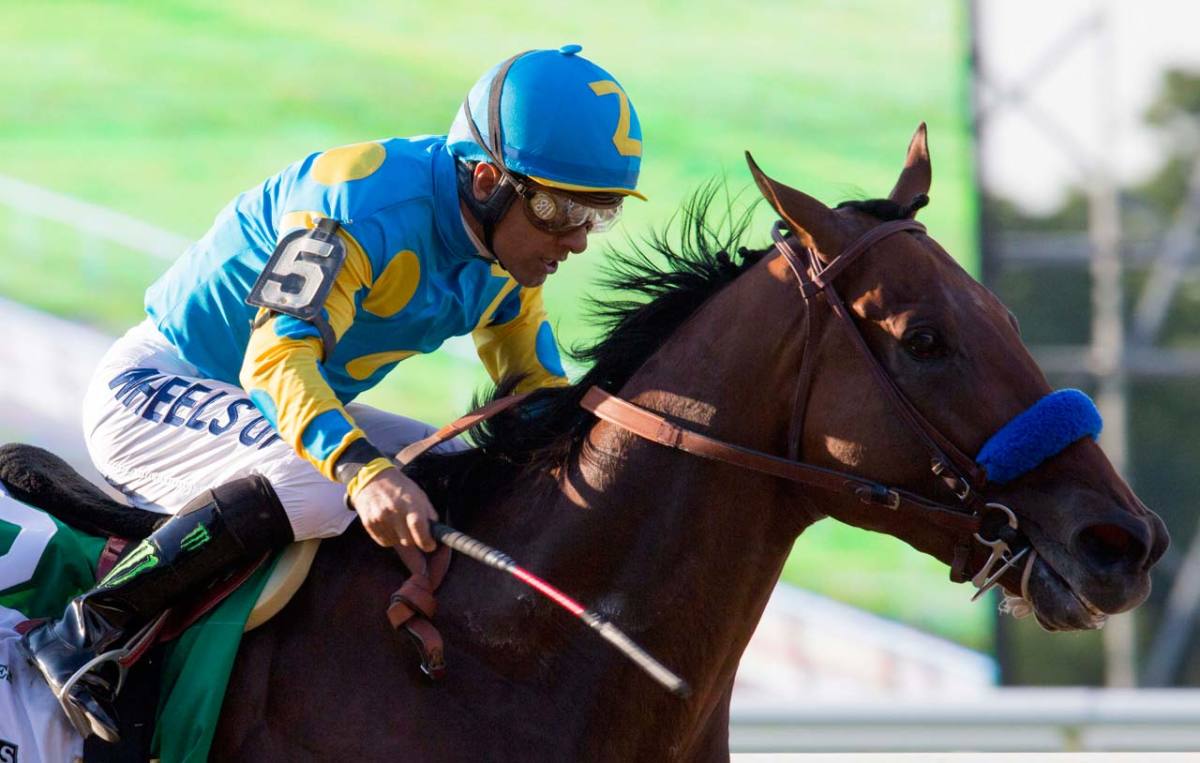
American Pharoah led all the way to win the Belmont Stakes by 5 1/2 lengths on Saturday, becoming the first horse since 1978 to sweep the Kentucky Derby, Preakness and Belmont Stakes--one of the sporting world's rarest feats. Here are SI's best photos from the event. (Text credit: AP)
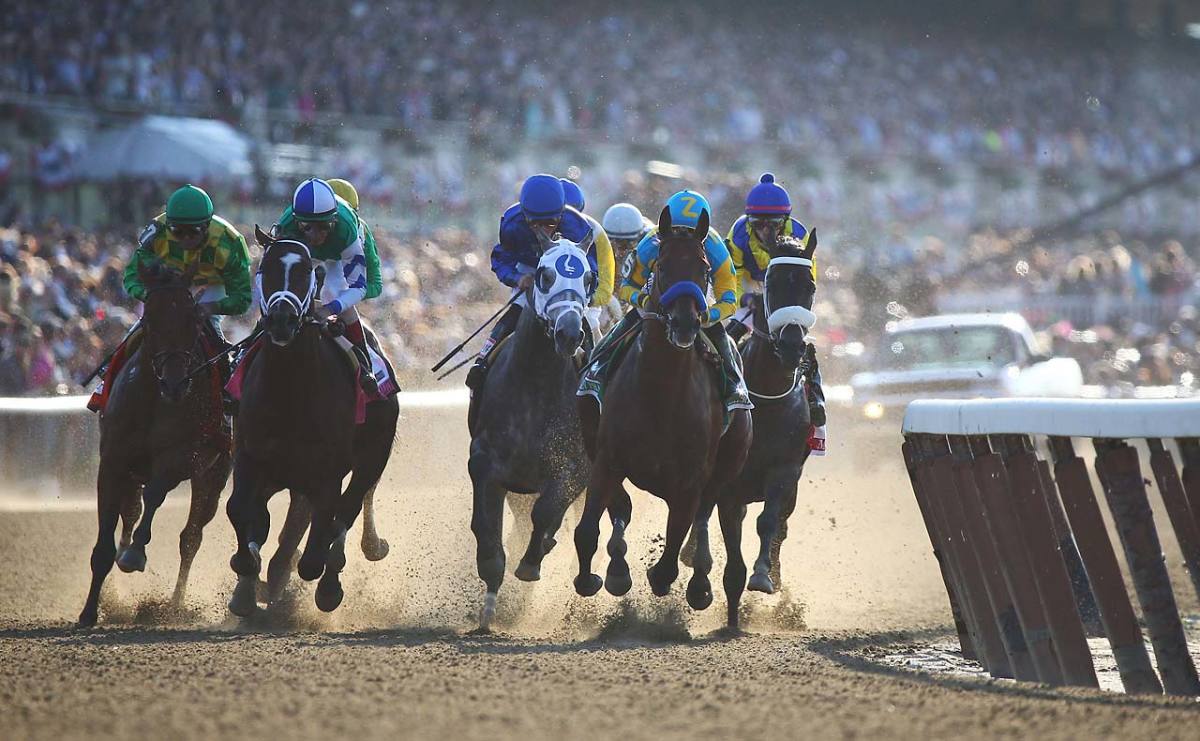
The bay colt with the unusually short tail easily defeated seven rivals in the grueling 1 1/2-mile race. (Text credit: AP)
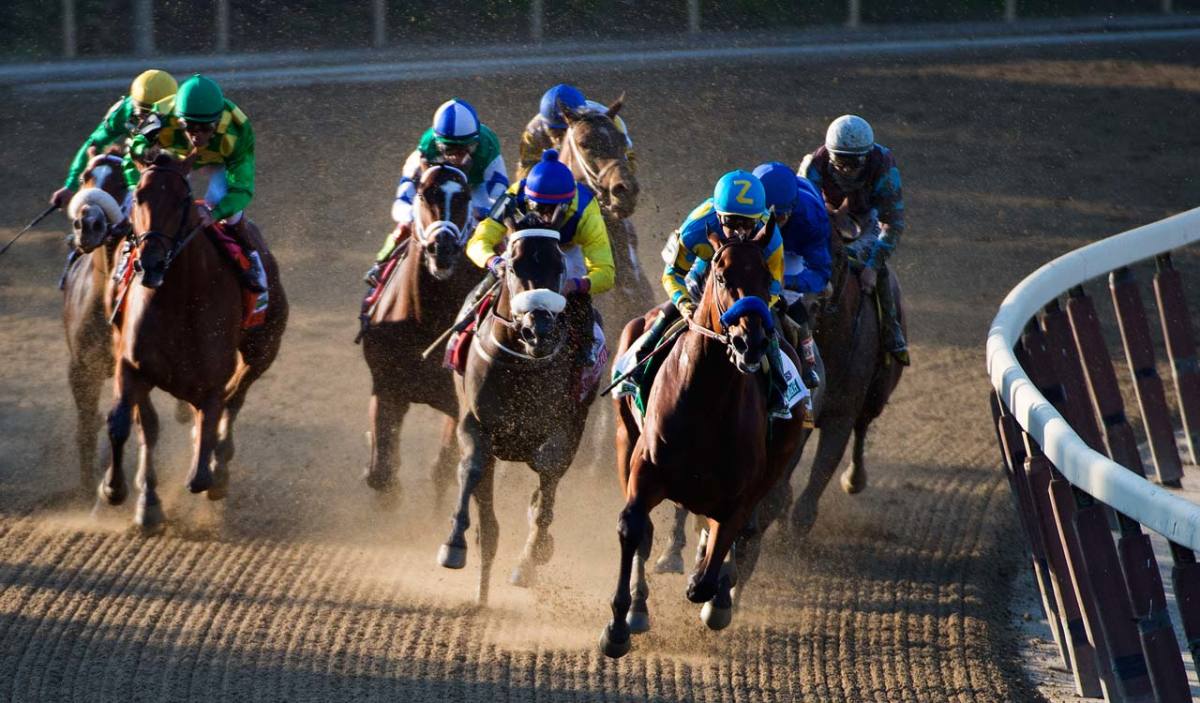
American Pharoah covered the distance in 2:26.65 -- the sixth-fastest in Belmont history. (Text credit: AP)
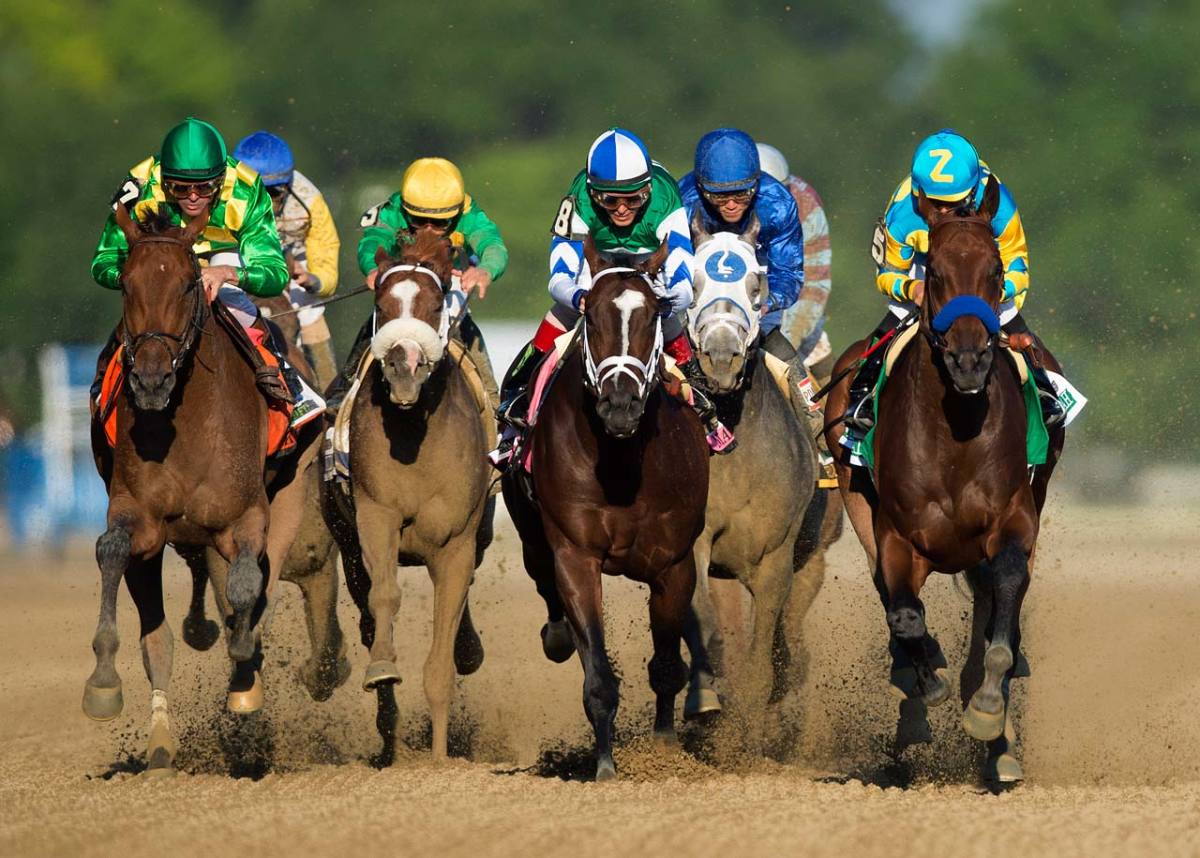
American Pharoah is the 12th horse and first since Affirmed in 1978 to win three races on different tracks at varying distances over a five-week span. (Text credit: AP)
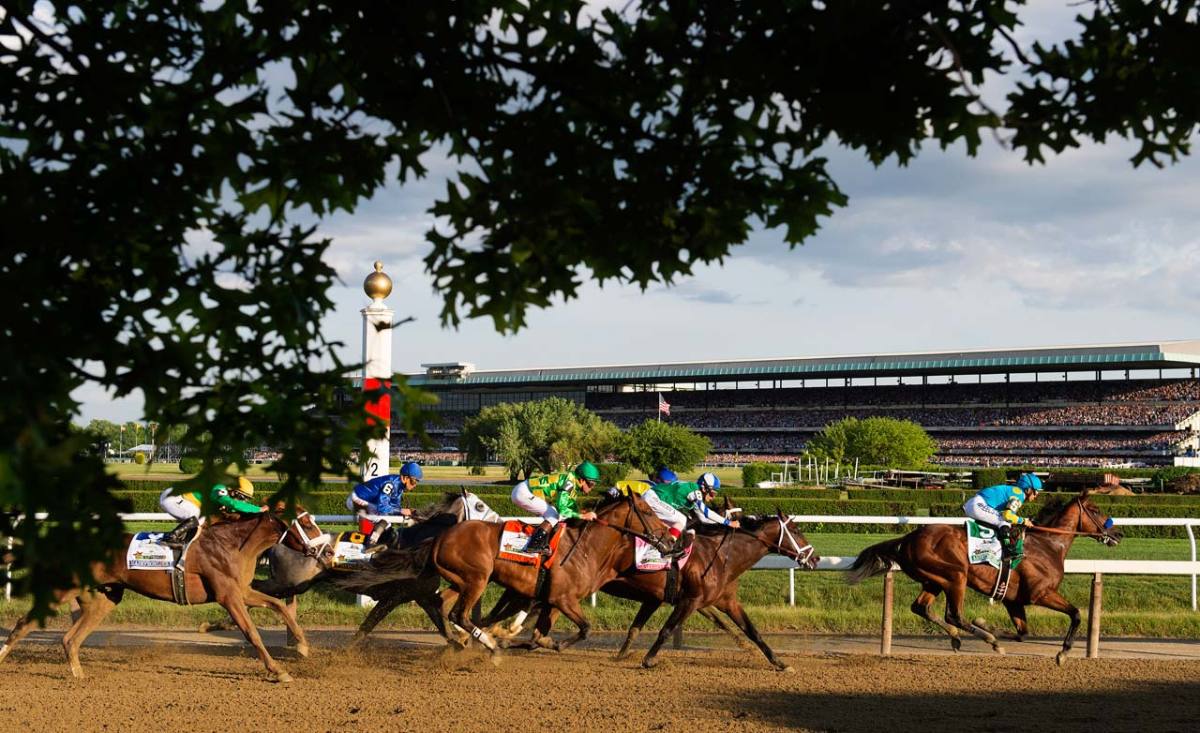
Jockey Victory Espinoza hustled American Pharoah to the lead leaving the No. 5 post and quickly got him over to the rail. He was never seriously challenged after that. (Text credit: AP)
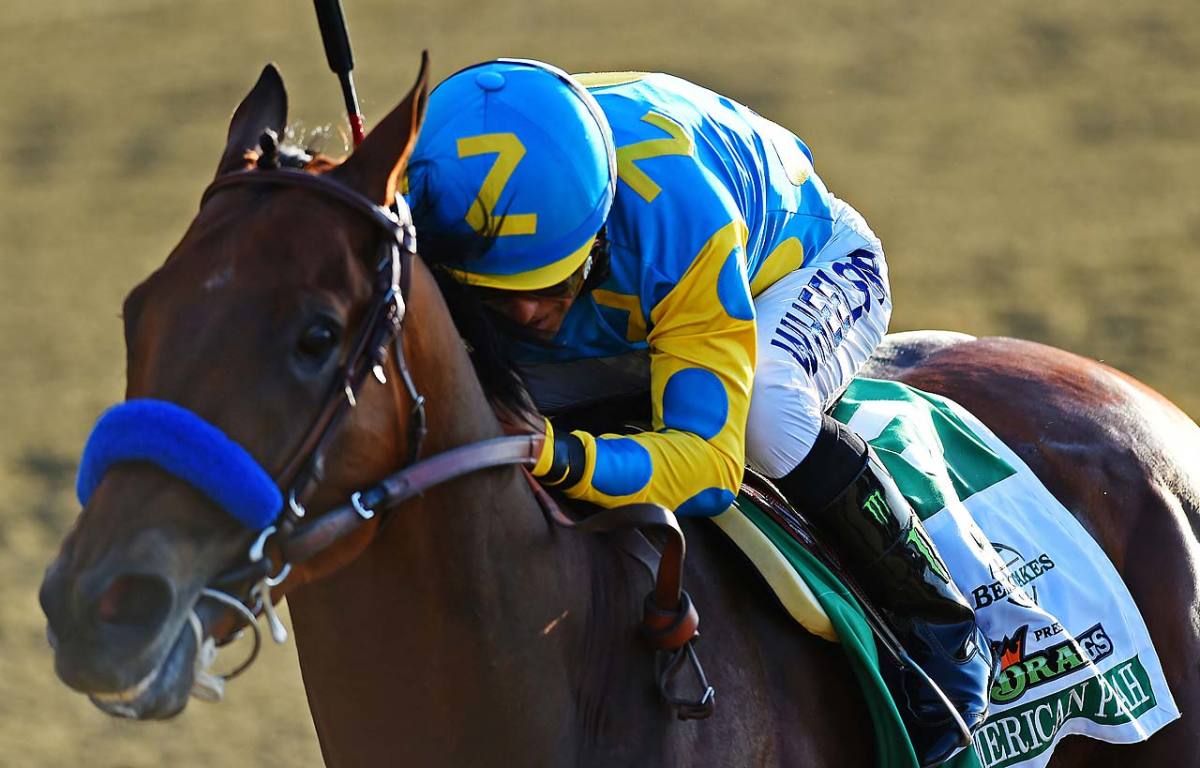
American Pharoah ran the final quarter-mile in 24.32 seconds, faster than Secretariat's time of 25 seconds in winning the 1973 Belmont. (Text credit: AP)
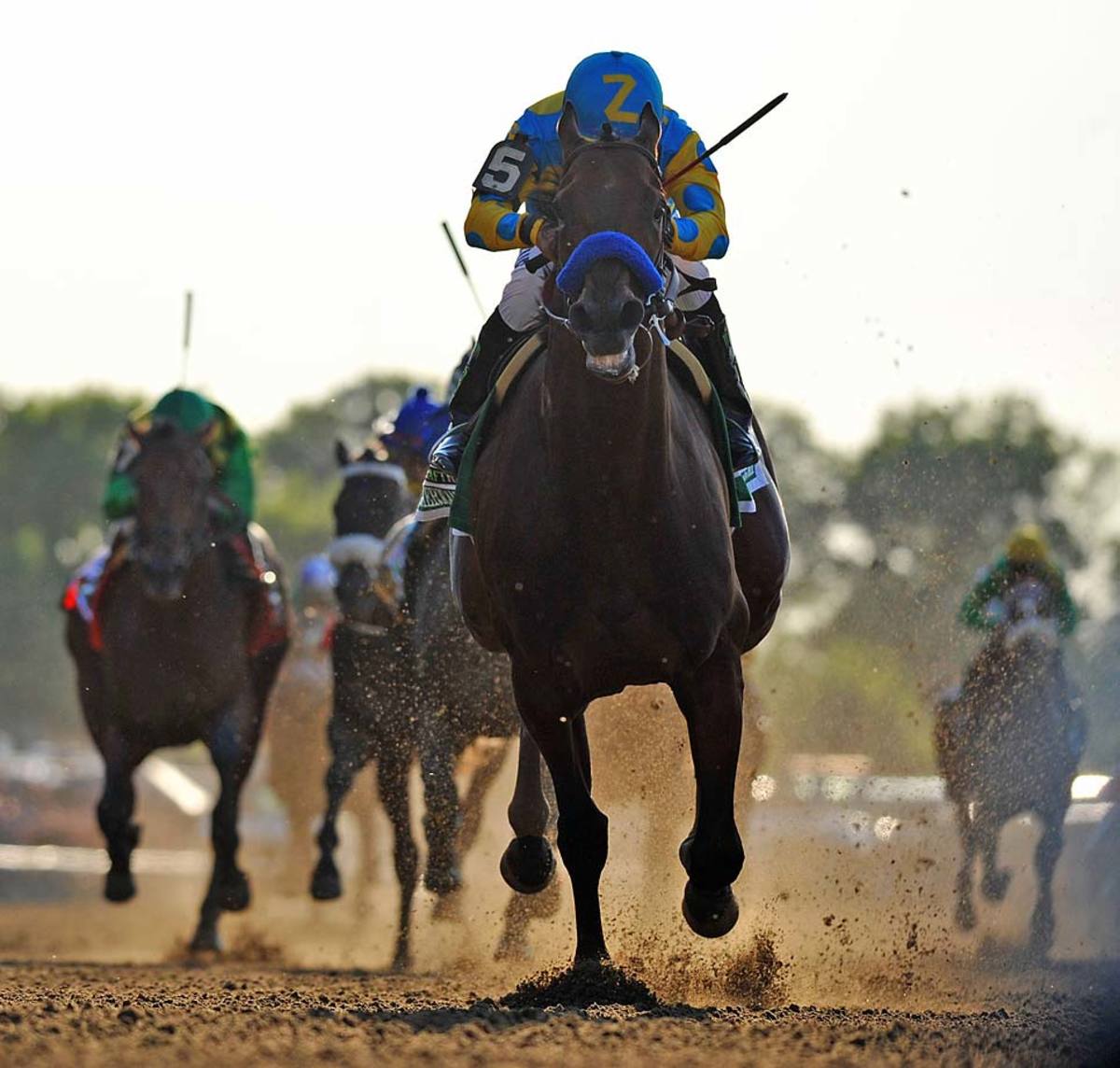
Sent off as the overwhelming 3-5 favorite, American Pharoah paid $3.50, $2.80 and $2.50. (Text credit: AP)
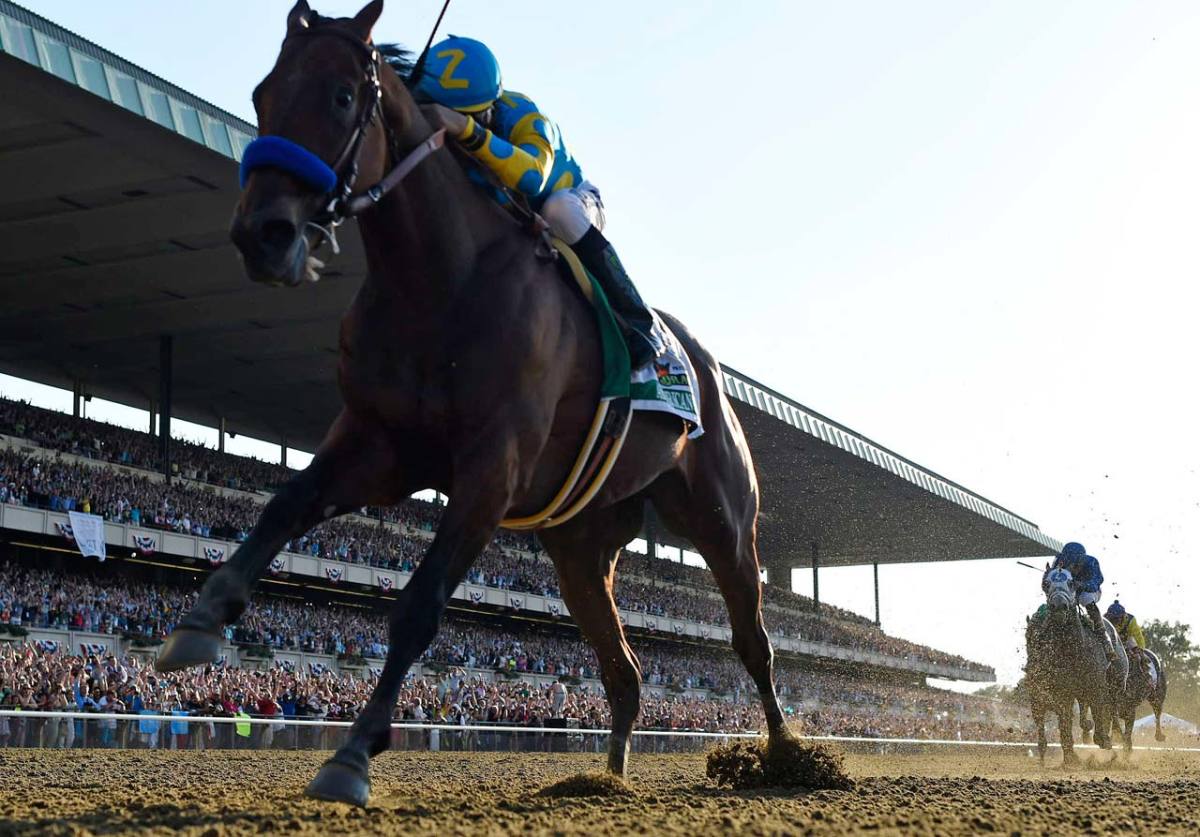
American Pharoah delivered a victory for the Egyptian-born Zayat, who bred the colt and put him up for sale before buying him back for $300,000. (Text credit: AP)
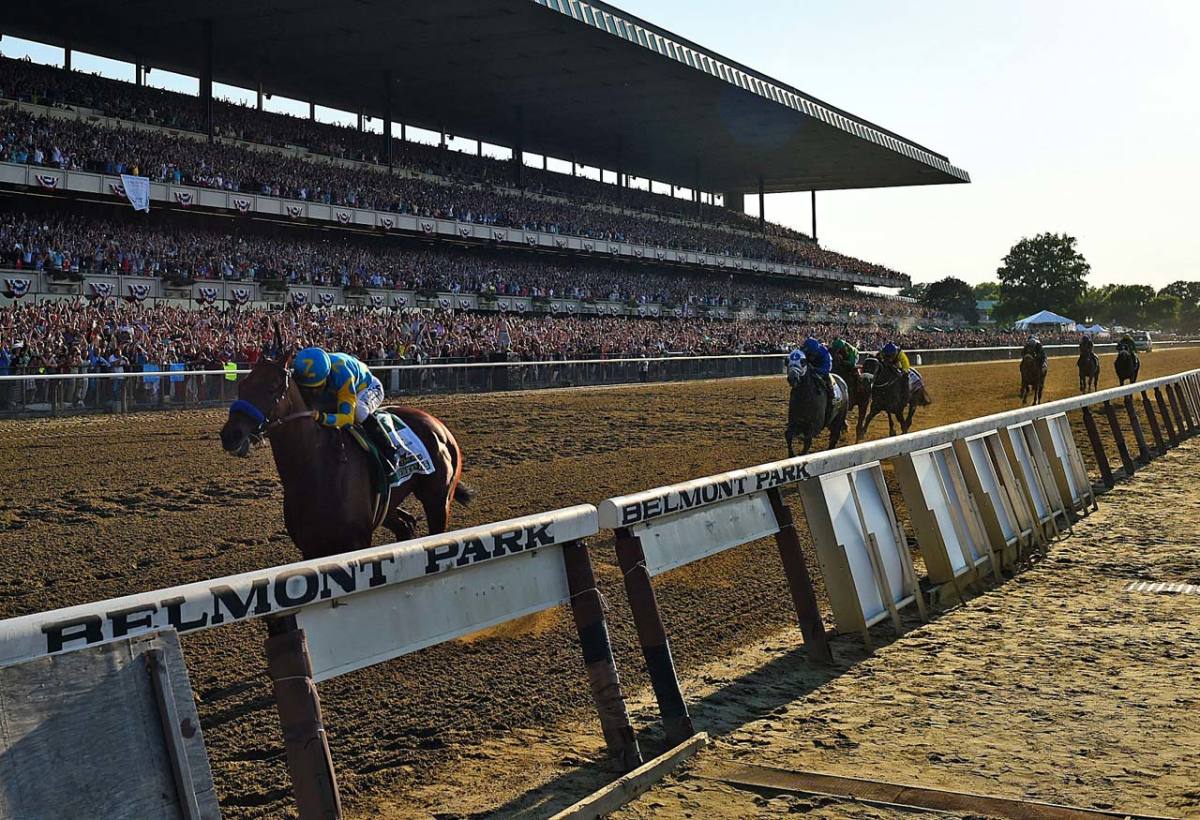
American Pharoah was followed by second-place finisher Frosted, while Keen Ice was another two lengths back in third. Mubtaahij was fourth, followed by Frammento, Madefromlucky, Tale of Verve and Materiality. (Text credit: AP)
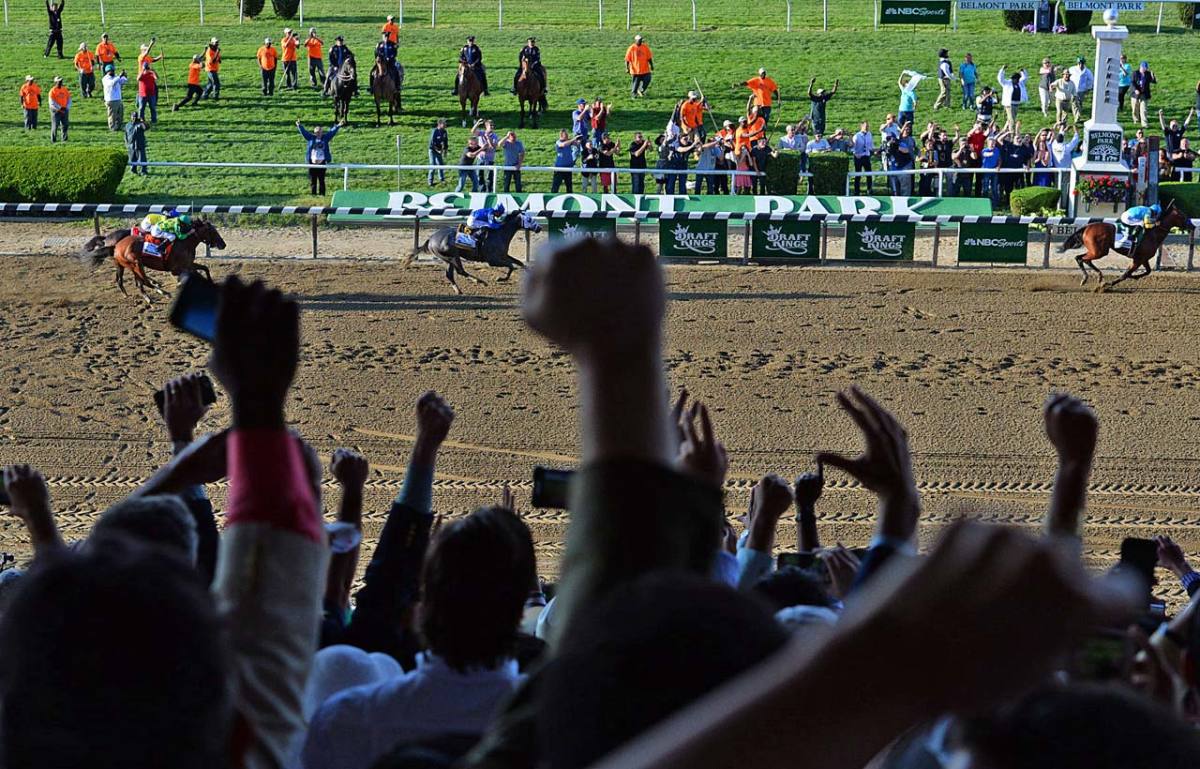
American Pharoah joined the exclusive club of Triple Crown winners Sir Barton (1919), Gallant Fox (1930), Omaha (1935), War Admiral (1937), Whirlaway (1941), Count Fleet (1943), Assault (1946), Citation (1948), Secretariat (1973), Seattle Slew (1977) and Affirmed. (Text credit: AP)
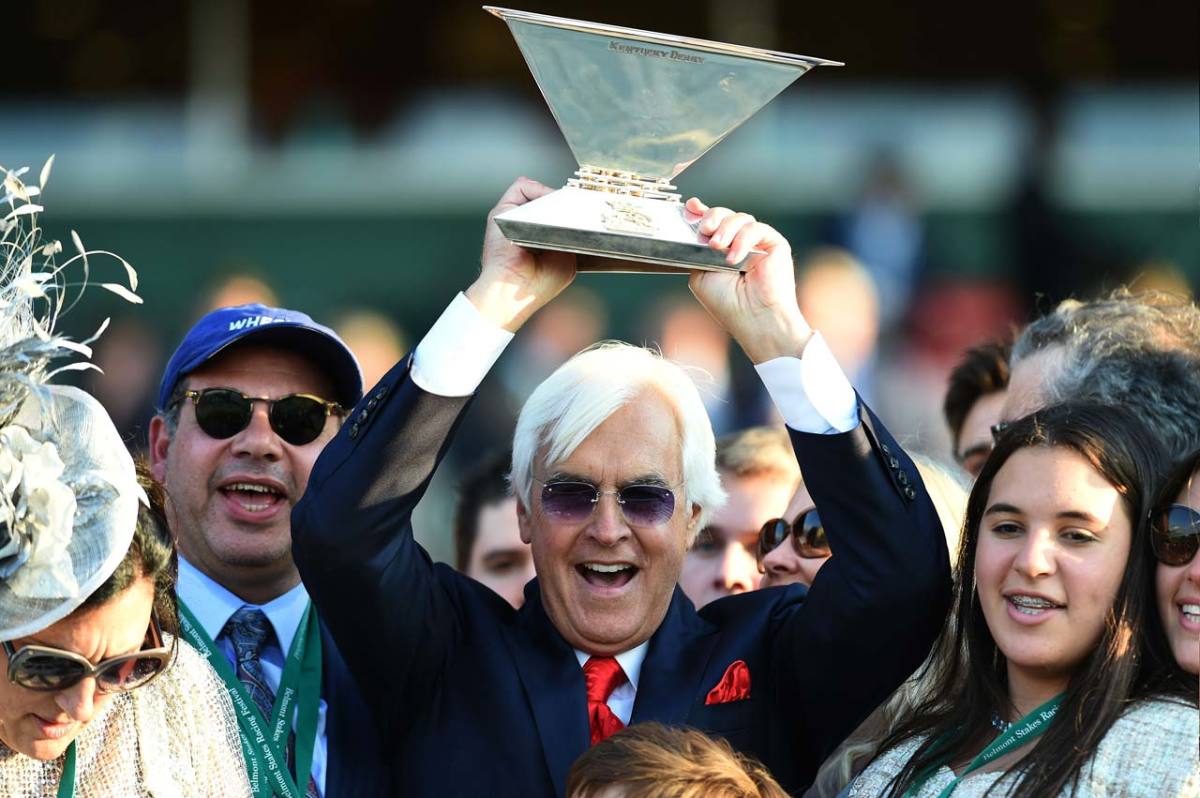
American Pharoah finally made a Triple Crown winner out of trainer Bob Baffert, who won on his record fourth Triple try, having lost in 1997, 1998 (by a nose) and in 2002. (Text credit: AP)
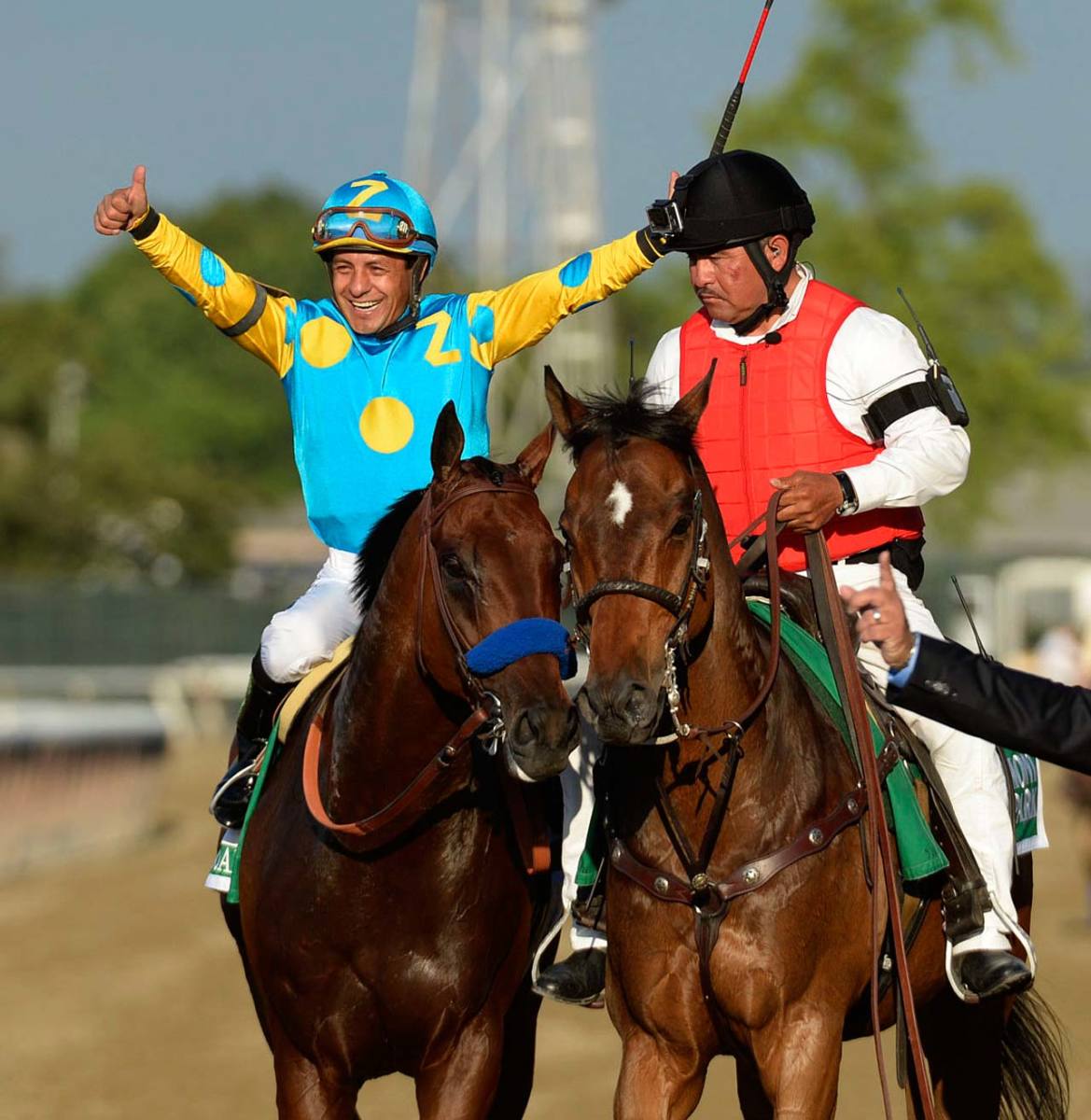
Jockey Victor Espinoza ended his own frustrating history in the Triple Crown. He got it done with his record third shot after failing to win in 2002 and in 2014 on California Chrome. (Text credit: AP)
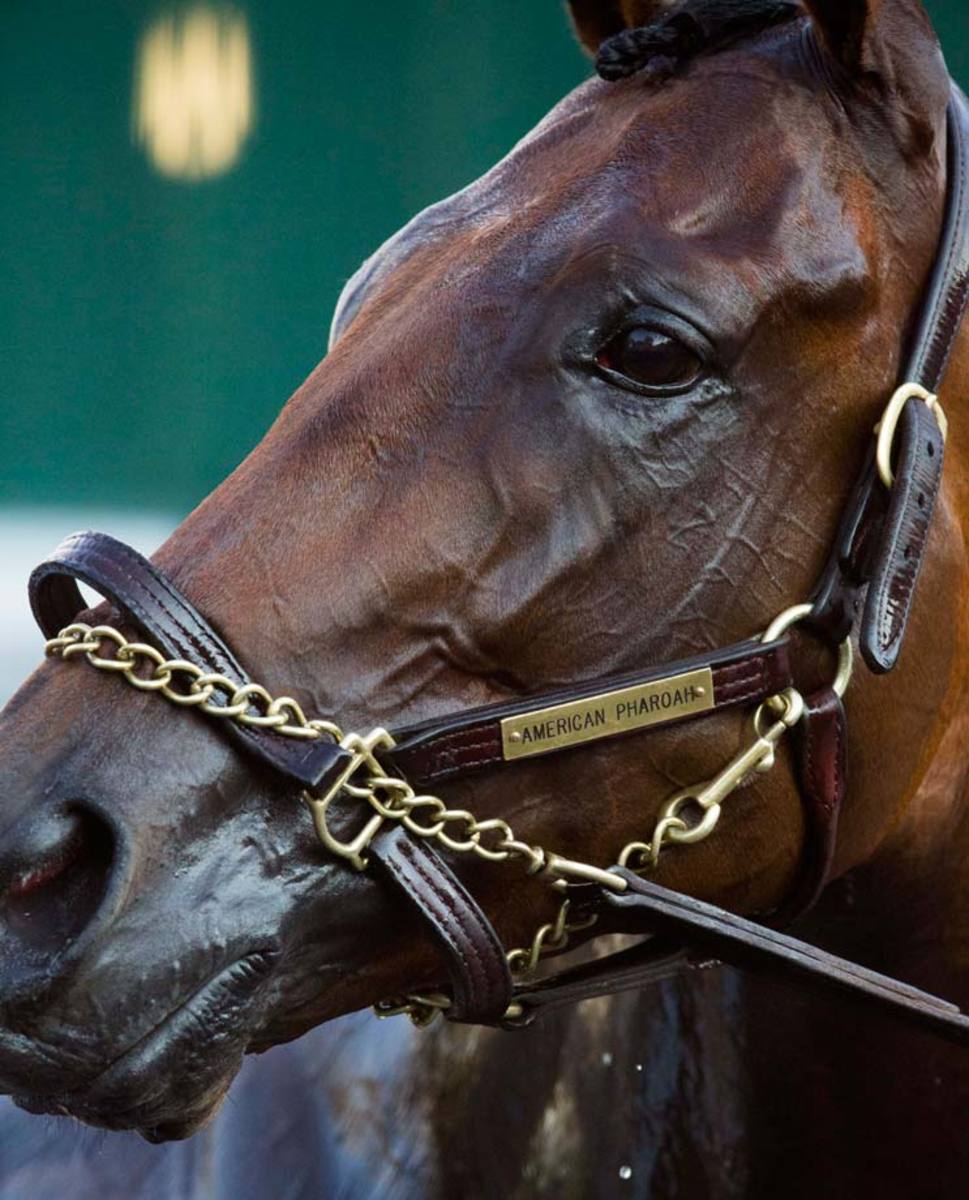
Since 1978, the rigors of the Triple Crown had done in 13 other horses who won the Derby and the Preakness--with 12 losing the third leg and I'll Have Another scratched with a leg injury in 2012. American Pharoah brought an end to that drought. (Text credit: AP)
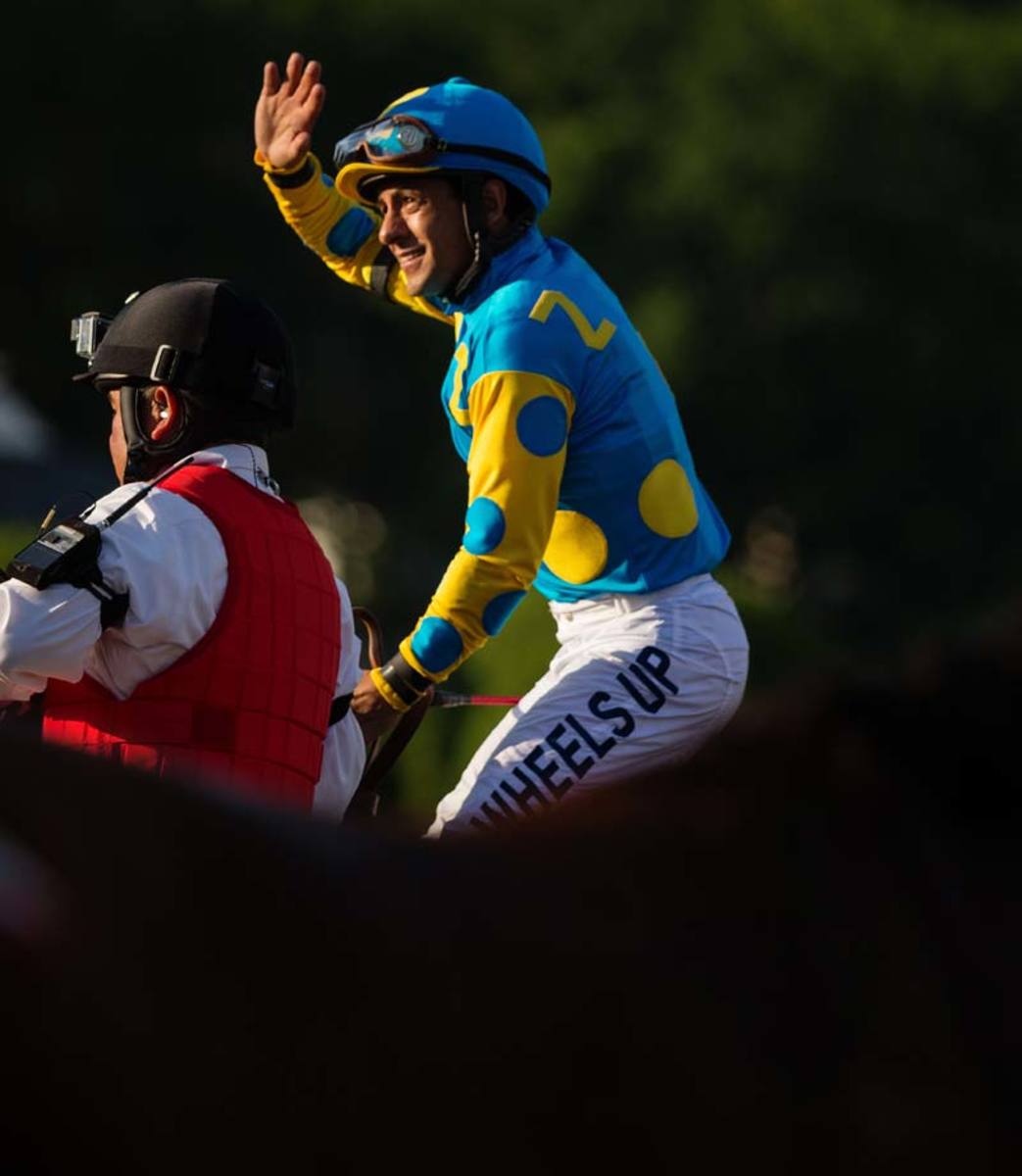
Unlike Affirmed, who dueled Alydar in all three races, American Pharoah didn't have a specific rival since he was the only horse to run in all three Triple Crown races. Going into the Belmont, American Pharoah had beaten all of his seven challengers before. (Text credit: AP)
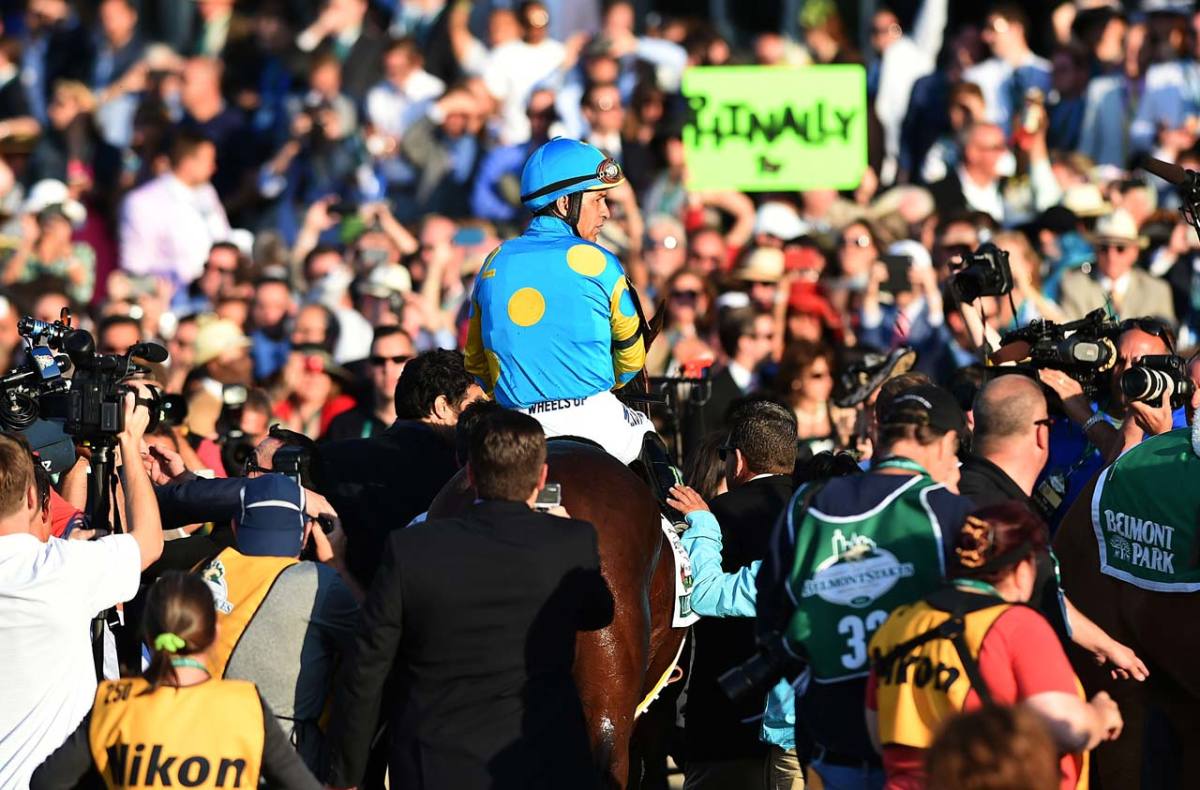
After making his way back to the crowd, Espinoza took American Pharoah nearly the length of the sprawling grandstand so fans could pay their respects to the champion. (Text credit: AP)
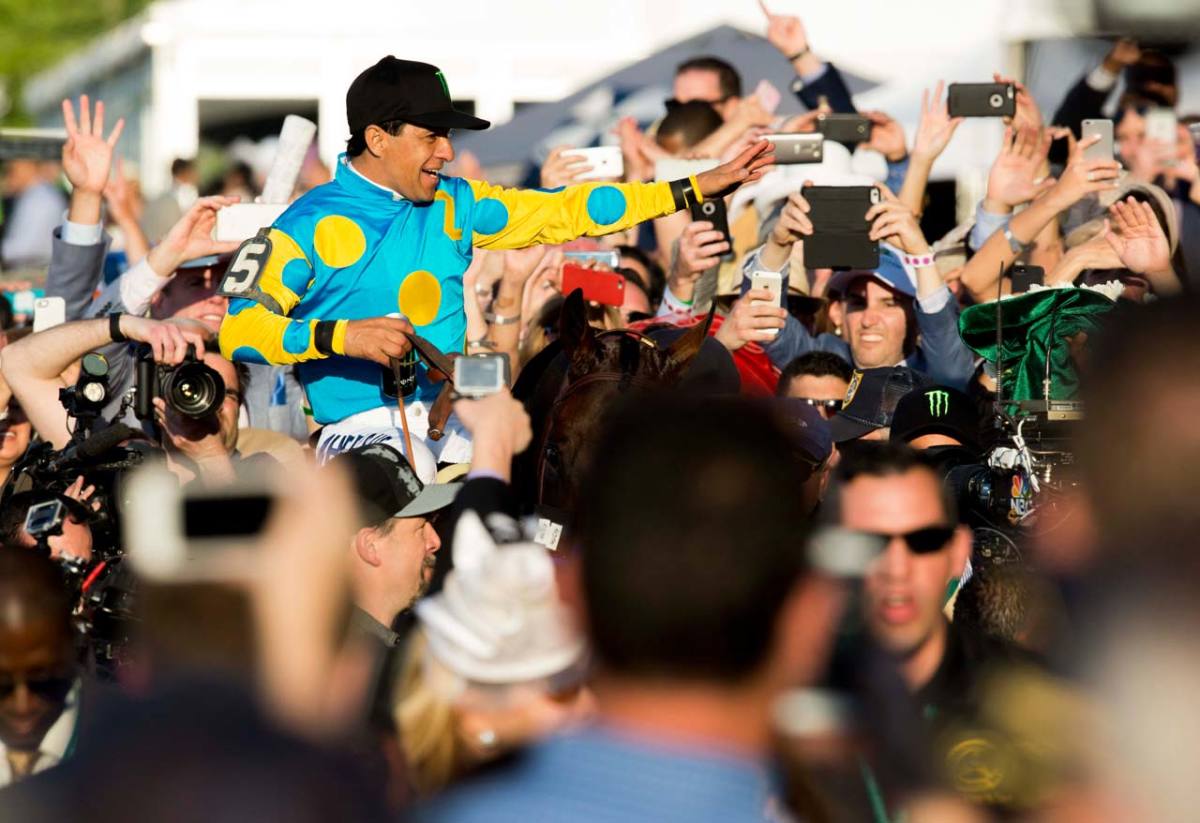
''That's a hell of a horse,'' said Gary Stevens, who finished seventh aboard Tale of Verve. ''The race was over in the third jump from the gate.'' (Text credit: AP)
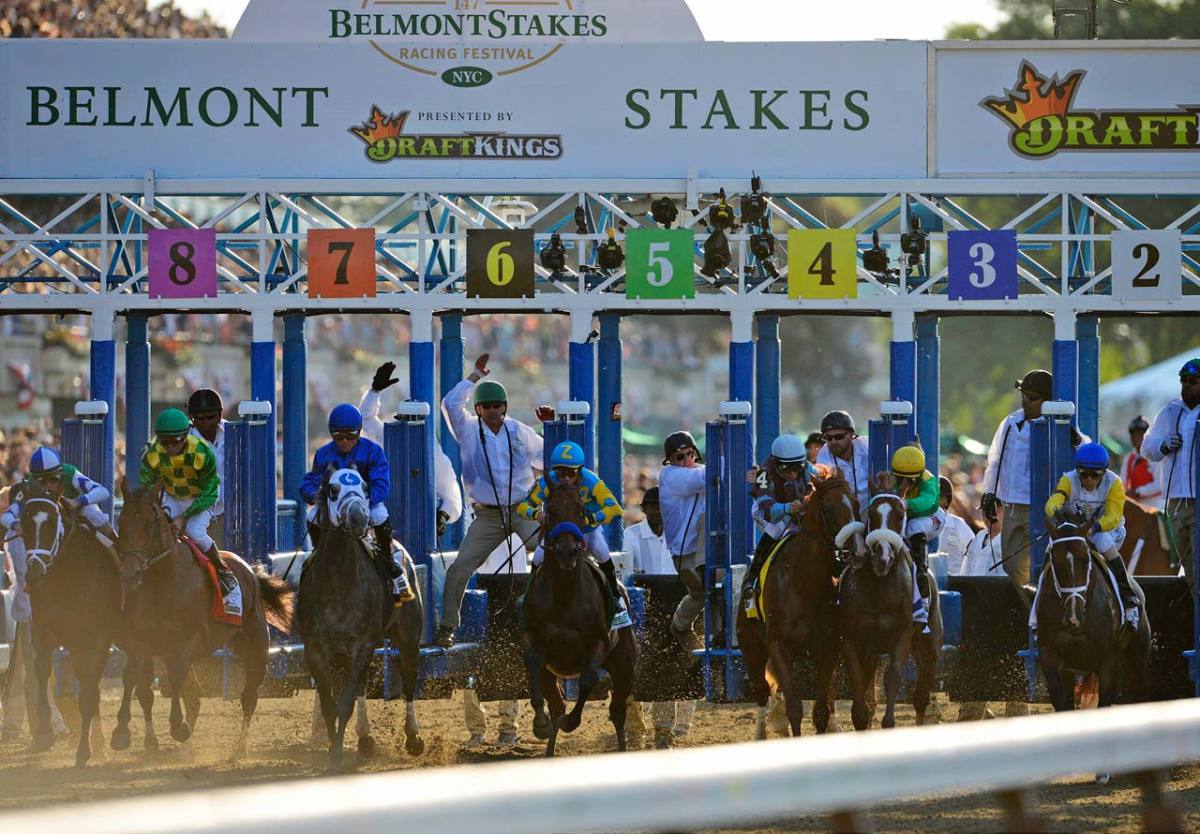
As the horses were heading to the starting gate, owner Ahmed Zayat was overflowing with confidence and turned to his wife. ''I told her, `Get ready to be the owner of the 12th Triple Crown winner,''' he said. (Text credit: AP)
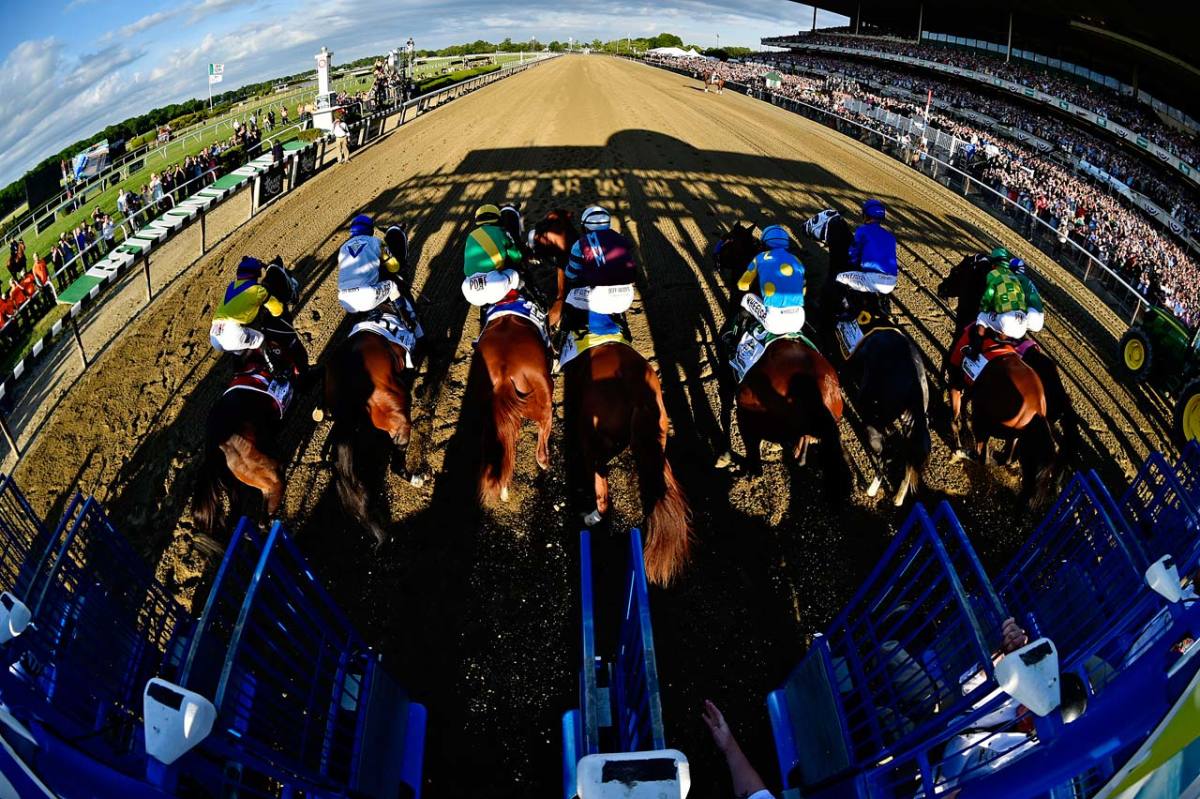
The start was clean as American Pharoah broke from the fifth gate to the lead.
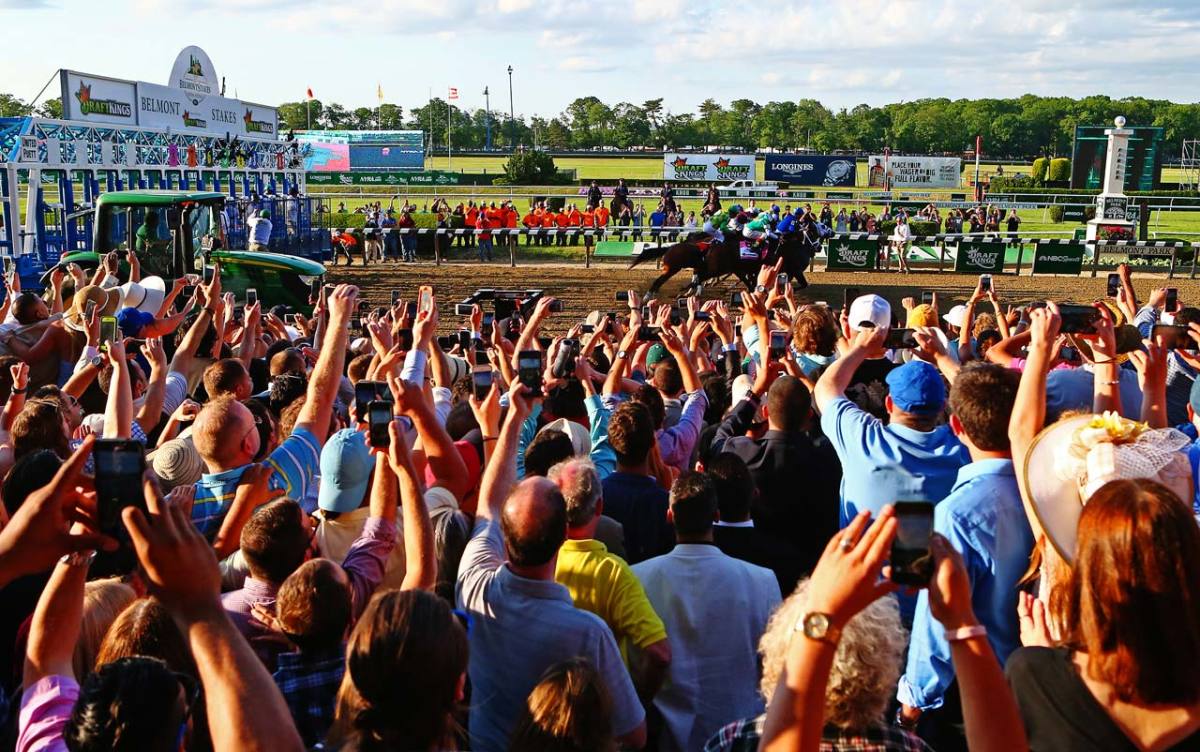
The crowd of 90,000--capped to avoid overcrowding and long lines from last year's total of 102,199--roared for American Pharoah from start to finish. (Text credit: AP)
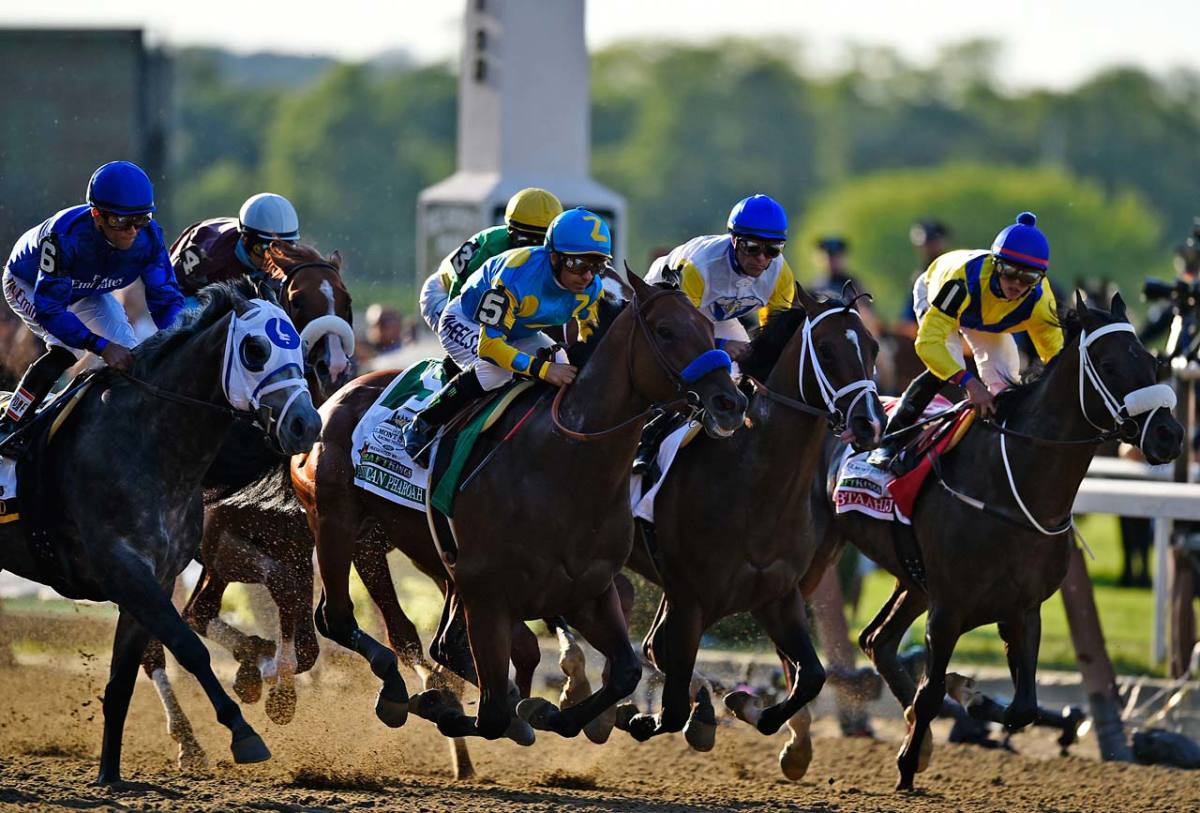
It's unlikely the champion heard them since American Pharoah wears ear plugs to block noise that might get him worked up. (Text credit: AP)
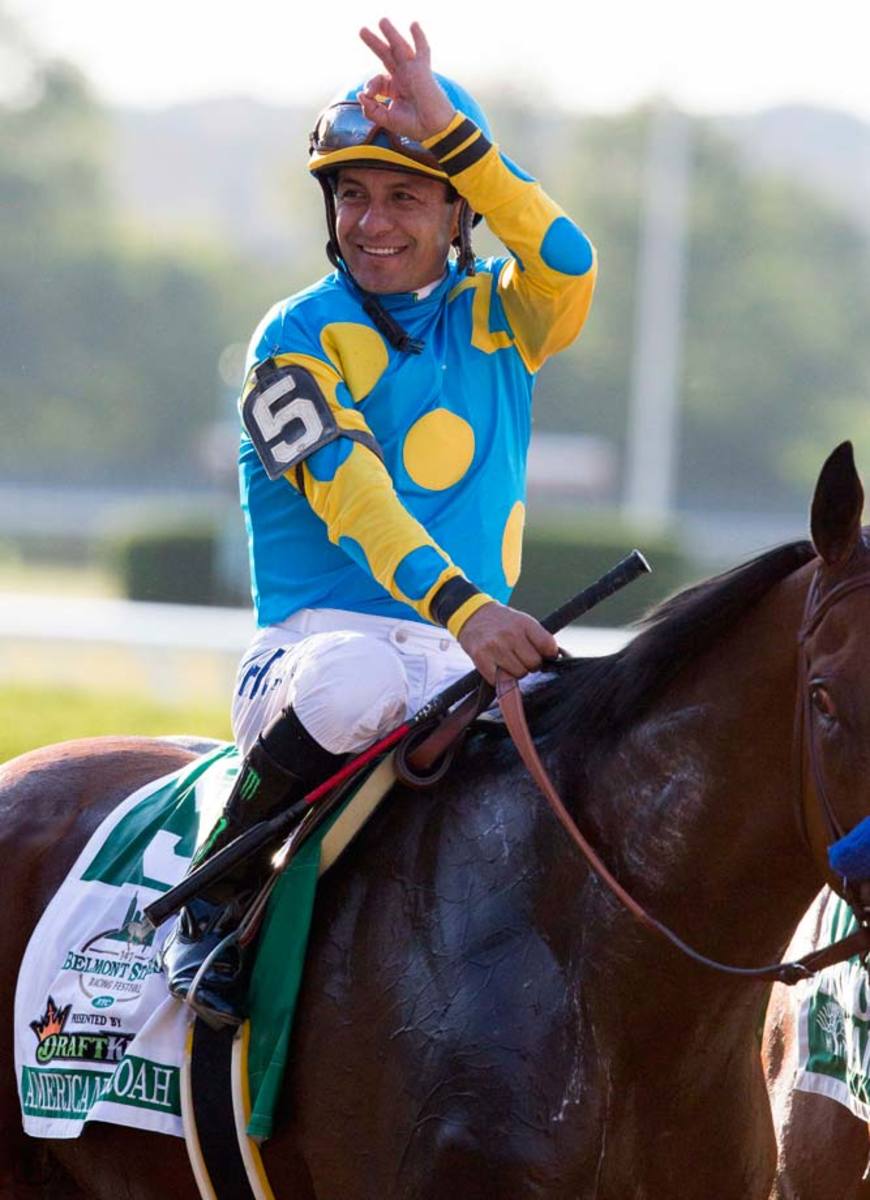
Before demolishing his rivals on Saturday, American Pharoah won the Kentucky Derby by one length on May 2 and then romped to a seven-length victory in the rainy Preakness two weeks later. (Text credit: AP)
Under grey clouds yielding to warm sunshine, Martin Garcia guided Pharoah onto the Churchill surface. Briefly, he was the only horse on the freshly harrowed track, an oval of brown corduroy lines. Baffert held a walkie-talkie in his right hand; another was clipped to Garcia’s chest. Garcia is Baffert’s No. 1 jockey, but, because Baffert esteems Garcia’s skill at estimating pace and effort, he also works all of his best horses in morning training. As to why Garcia did not ride Pharoah to the Triple Crown, there is a story there, as well. Keep reading.
Baffert’s walkie-talkie crackled with Garcia’s voice. “Chingon!” Garcia said, enthusiastically. “Super chingon.” Chingon is Spanish slang for a variety of things, all of them exemplary: awesome, cool, strong, smart, tough. It is the type of word that would have been used to describe Michael Jordan in his prime, or Lawrence Taylor in his.
Baffert began laughing. “Chingonis good,” he said. “Chingonis really good.”
American Pharoah effortlessly circled the track that morning, barely taxing himself while running as fast as many racehorses run in competition. Baffert conducted a brief press conference in the shadow of his barn while Garcia took a shower, and then both men raced to the airport for a flight back to California. In the middle of the afternoon, Baffert sent another text: “Super Chingon. F------ awesome.”
It became the operative word for American Pharoah in the Baffert barn. Six days after Garcia first said it, American Pharoah again worked flawlessly at Churchill Downs. Two days after that, on the Wednesday before the Belmont, Baffert, Zayat and Espinoza were the center of attention during the draw for post positions. As Baffert hustled between interviews, he pulled me aside and whispered into my ear: “Still super chingon, man. Still good.”
[daily_cut]On the Friday morning before the Belmont, American Pharoah was sent out for his customary—and his last—morning gallop under regular exercise rider Georgie Alvarez. After the brief gallop, Alvarez walked Pharoah through a gap in the fence near the first turn on the racetrack and turned right for the shaded, 300-yard walk back to Barn 1, the colt’s temporary home in New York. Baffert watched from nearby, standing between Barn 7, where 1997 and ’98 Belmont and Triple Crown losers Silver Charm and Real Quiet had been stabled; and Barn 8, where 2002 Belmont and Triple Crown loser War Emblem had lived.
Baffert hustled to catch up to his horse, alongside Zayat’s small entourage. Alvarez looked down from Pharoah. “Chingon, patron,” said Alvarez. “So chingon.” There was prerace concern among track insiders that Baffert had brought Pharoah to Belmont too late for the colt to have a chance to adapt well to Belmont’s unique racing surface. Alvarez said, “He loves this track. He gets over it so nice.”
Pharoah’s adaptability is not a shock. He lived on three different Kentucky farms in the first year of his life and then was broken (taught to run) at a training center in Florida. Once he was shipped to Baffert, he ran his first two races at Del Mar, his third at Santa Anita and his two Kentucky Derby preps in Arkansas. He is known around Baffert’s barn for possessing the sweet demeanor of a golden retriever—valuable in shipping around the country frequently, and also in bearing up under the camera onslaught that is a Triple Crown Belmont Stakes. “This horse can handle anything,” said Alvarez. “He’s too good.”
The Triple Crown trail extracted its pound of flesh from some of the participants. Zayat, who first made the money that enabled him to dive into the racing game by selling his Egyptian beer company for $280 million, has endured several legal entanglements and railed tempestuously against any media who reported on them. “I am emotional,” he said to me two days before the Belmont, and one day after shouting at me during the post position draw. “I am competitive. You have to understand this about me.”
American Pharoah Triple Crown win prompted 48,000 tweets per minute
Zayat struck a sponsorship deal with Monster Energy drinks that made the company a significant presence on Espinoza’s silks and American Pharoah’s tack; Baffert likewise made a deal to allow a man in a Burger King costume to stand in his box during the race. (Baffert told me after the Preakness that he had been offered $150,000 to let the Burger King man near him for that race; the Belmont brought an undisclosed payment.)
None of this affected Pharoah. As the horses loaded into the starting gate on Saturday, I turned from a viewing spot on the catwalk that would later be the site of bedlam. I made eye contact with Baffert and he mouthed the word: “Chingon.” Clearly: All systems go.
Espinoza, 43, was on Pharoah almost by accident. Garcia rode the colt in his debut race on Aug. 9 at Del Mar. Pharoah blew up in the paddock before the race, sweating profusely and panicking in front of the popular resort track’s bustling crowd. He finished a well-beaten fifth. Baffert was stunned, having expected great things. For Pharoah’s next race, also at Del Mar 25 days later, Baffert decided to change riders (this was fine with Garcia, who had not liked his experience on the horse), and to outfit Pharoah with puffy earplugs, like those that had been worn by the great mare Zenyatta.
Baffert’s first choice to replace Garcia had been Rafael Bejarano, but he was unavailable. Baffert tried Mike Smith. Also unavailable. Baffert even tried Gary Stevens, but Stevens had undergone recent knee replacement surgery and wasn’t ready to resume riding. Meanwhile, agent Brian Beach had contacted Baffert and told him that Espinoza was available. Espinoza had once been a regular rider for Baffert, but the two had seldom worked together in recent years. “Victor is pretty calm out there,” said Baffert. “I figured maybe he would be good for the horse.”
Espinoza won that race by 4¾ lengths and has never lost on Pharoah. The plan for the Belmont was simple: “I’m going to tell Victor to send him,” Baffert said two days before the Belmont. “Just break him and get him out there. Let him gallop away.” That is exactly what Espinoza did on Saturday. Pharoah hesitated slightly when the starting gate opened, but then Espinoza, much as he had in his wire-to-wire sloppy Preakness victory, threw his hands forward and shot Pharoah into the lead. “So much power, so much energy,” said Espinoza.
• SI VAULT: Why I hate Smarty Jones
When the field swung into the first turn, Pharoah was comfortably in front, and completed the first quarter in 24.06 seconds, a soft pace that ensured that Pharoah would not tire quickly. “I think, in that first turn,” said Espinoza, “that was the happiest I’ve ever been in my life.”
Baffert said, “I knew the race was over on the first turn.” A half-mile went in 48.83 seconds and three-quarters of a mile in 1:13.41 seconds. “Ballgame,” said McCarron. “Victor was just galloping along out there.”
Espinoza sat ice cold into the sweeping final turn. “He started to pull on me in the turn,” said Espinoza. “He wanted to go. I gave him a little rein and then I pulled him back a little. I didn’t want to choke him down.” Finally, at the top of the stretch, Espinoza let Pharoah run and he exploded away from the field. He ran his six quarter-miles in 24.06, 24.77, 24.58, 24.58 again, 24.34 and 24.32, as if in one of his workouts at Churchill Downs. A trophy that had for so long been elusive was finally taken down with consummate ease.
Pharoah cantered back to the winner’s circle now in the company of greatness. War Admiral won the Triple Crown in 1937. Secretariat, of course, won it in 1973. It is among the most exclusive clubs in any sport anywhere. The achievement defines those who achieve. Twenty minutes after the race, Belmont remained nearly full, spectators in thrall. “Look at that,” said former New York jockey Richard Migliore, witness to every past failure. “People still standing. Look at them.”
It was yet another June evening at Belmont Park, yet another horse running for the Triple Crown, yet another reach at history. The rest was so different, a prayer answered in the gloaming. Now the horse was right. Now the wait is done.
